2018 SkS Weekly Climate Change & Global Warming Digest #6
Posted on 11 February 2018 by John Hartz
Story of the Week... Editorial of the Week... El Niño/La Niña Update... Toon of the Week... Quote of the Week... Graphic of the Week... SkS in the News... Photo of the Week... SkS Spotlights... Video of the Week... Report of Note... Coming Soon on SkS... Poster of the Week... Climate Feedback Reviews... SkS Week in Review... 97 Hours of Consensus...
Story of the Week...
Keeping the world below 2°C of warming needs tech we don’t have
European national science academies report warns tepid emission cuts not enough.
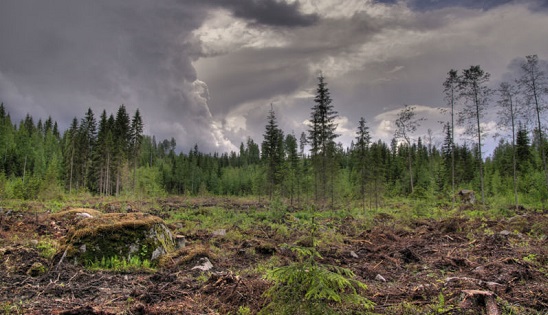 Reforesting would help, but we're still deforesting. Photo: Mikko Muinonen
Reforesting would help, but we're still deforesting. Photo: Mikko Muinonen
The analysis is well known to everyone who has paid even a little attention: the world hasn’t yet done enough to lessen the impacts of climate change. The last Intergovernmental Panel on Climate Change report included greenhouse gas emissions scenarios that could limit global warming to two degrees Celsius or less, but we’re not even close to a trajectory that would achieve any of them.
But there’s something about those two-degrees scenarios you may not know, which climate scientists have been talking a lot about recently. Those scenarios involved a substantial deployment of technologies to actively remove CO2 from the atmosphere. Without those technologies, we’re even further from sufficient emissions cuts.
That leaves us with a crucial question: can carbon dioxide removal techniques be scaled up to the necessary level in time? A new European Academies Science Advisory Council (EASAC) report—reviewed and endorsed by the national academies of more than two dozen countries—evaluates the outlook for carbon dioxide removal. And it’s not optimistic.
Keeping the world below 2°C of warming needs tech we don’t have by Scott K Johnson, Ars Technica, Feb 5, 2018
Editorial of the Week...
Universities Should Encourage Scientists to Speak Out about Public Issues
Opioids. Fracking. Zika. GMOs. Scientists should be speaking up about all sorts of science-based issues that affect our lives. Especially now, when Trump administration officials tell us that climate change is debatable and that killing African elephants can benefit the herd, scientists should be constantly exposing misinformation, bogus alternative facts and fake science.
Unfortunately, the greatest obstacle to informing the public may be the very universities that many scientists work for.
When Scientific American editors talk with Ph.D. students, postdoctoral researchers and early-career scientists, they often tell us that an adviser or senior department member has instructed them not to write blogs or articles for the general public, speak at public events or talk with reporters and to stay away from social media. In a 2016 survey of 61 chairs of U.S. and Canadian medical departments, only 23 percent said it was important for faculty to participate in blogs hosted by medical journals. Never mind personal blogs and those in the media.
Universities Should Encourage Scientists to Speak Out about Public Issues, Opinion by the Editorial Board of Scientific American, February 2018 Print Edition
El Niño/La Niña Update...
February 2018 La Niña update: tuned in
Many thanks to Tom for covering my post lastvd month, allowing me to focus on the American Meteorological Society ’s annual meeting (where I talked about the blog, and enjoyed my company on the plane ride home). It’s good to be back, and I’m glad to see our La Niña is still hanging around… although probably not for much longer. In fact, the current ENSO forecast from the Climate Prediction Center and IRI predicts a 55% chance that neutral conditions will be in place by spring 2018. Let’s get to it!
February 2018 La Niña update: tuned in by Emily Becker, NOAA's Climate.gov, Feb 8, 2018
Toon of the Week...

Quote of the Week...
In 2009, a group of prominent doctors and climate scientists gathered in Washington DC for a forum on the psychological dimensions of climate change. Their discussion resulted in the first major report on the subject, which found that although an estimated 200 million Americans will be exposed to "serious psychological distress from climate related events," the US health care system was only "minimally prepared" to address these issues.
"The report is still valid after seven years," Lise van Susteren, a forensic psychiatrist and co-author of the report, told me. "The psychological aspect of climate change was not being discussed at all in 2009, but climate change is increasingly being recognized [as a mental health issue] now."
Climate Change Is Giving Us 'Pre-Traumatic Stress' by Daniel Oberhaus, Motherboard, Feb 4, 2018
Graphic of the Week...
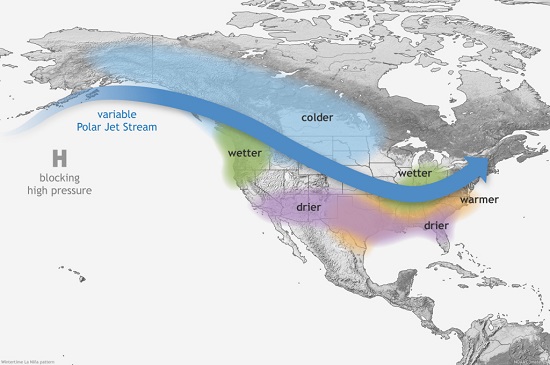
Typical impacts of La Niña on U.S. winter temperature and precipitation. Such impacts have been associated with past episodes, but all impacts aren't seen with every episode. Drawing by Fiona Martin. NOAA
La Niña is on its way out. What does that mean for California? by Jacob Margolis, Enviornment & Science, KPCC, Feb 8, 2018
SkS in the News...
[To be added.]
Photo of the Week...
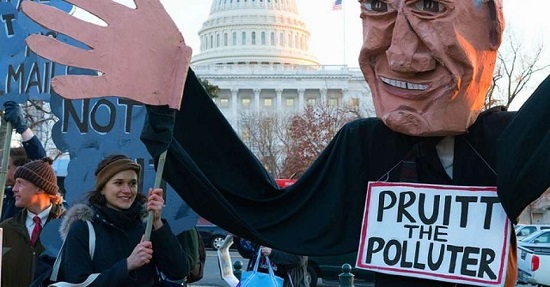
Pruitt Squirming Away From The Weight of Climate Evidence by Rachel Liker (Union of Concerned Scientists), Common Dreams, Feb 9, 2018
SkS Spotlights...

Climate and Mitigation Coalition
Climate change could re-shape patterns of migration and displacement.
Many will be forced from their homes by disasters. Others may want to move as a way of adapting unprecedented change. We exist to protect the rights of anyone facing these circumstances. We fight for humane and empowering policies to protect people who move, and for public acceptance and support.
Our aims
Our goal is to ensure a people centred policy response at the national and international level by:
- Building support for policies that allow people to strengthen their survival capacity through migration
- Ensuring adequate assistance and protection for people displaced internally and cross border as a consequence of slow and sudden onset disasters.
How we work
We work in several ways in persuit of our aims:
- Building knowledge and understanding: the relatioship between climate change and migration is not well understood by governmnets and civil society. By brining our expertise on the issue to people who needed it, we encourage informed debate.
- Influencing policy, law and international processes: we advocte in a number of international policy fora for improved policy and legislation on climate-linked migration and displacement.
- Shifting the discourse and coversation: the way in which the public and policy makers debate climate-linked migration will influence the solutions that are chosen. We therefore encourage debate around how climate-linked migration that centres the rights and welfare of people who move.
- Giving people a voice: much of our work focuses on the testimonies and stories of people who are already moving due to climate change impacts. We believe that these voices should be central to the debate about how this issue is addressed.
Video of the Week...
VIDEO: 2018 World Economic Forum Responding to Extreme Environmental Risks
How can countries and communities mitigate risk and build long-term resilience?
World Economic Forum: weforum.org. Published on Jan 24, 2018.
2017 was one of the hottest years on record. It ranked as the second-warmest by NASA and third-warmest by the National Oceanic and Atmospheric Administration. A major extension of the West Antarctic ice sheet has broken off and Swiss glaciers continue to recede. As the global climate changes and extreme weather events are proving more devastating and expensive, how can affected countries and communities mitigate risk and build long-term resilience? Is there still time to limit warming to two degrees and, if not, how do we adapt?
Today the mechanisms that are used are largely technological – food, water, heat, power – and affect every aspect of our economic and social lives. The future of people and the planet are dependent upon the technological ‘advances’ that are controlled by a few at the expense of the many. What we know about these technologies and the impacts they have on human societies and the planet is largely covered up. The truth is sugar coated and fed to the people, information omitted or falsified and presented as “the news” based on “the facts”. Climate change for example was covered up — denied, falsified, twisted, and spun — so that rich accumulators – individuals and corporations — could keep amassing vast wealth and hold onto political power. Even though they knew the existential risk — that what they were doing was exacerbating the conditions in the biosphere that make it possible for humans to live on Earth.
The cold hard truth is while President Trump and the U.S. Congress are still in denial, the Pentagon is preparing for the social and well as environmental catastrophes that are caused by climate change. So where does the public who care about the children who will be most affected by climate change find the information they need to voice their concerns and plan civil actions? How can countries and communities mitigate risk and build long-term resilience?
A great panel discussion from the 2018 World Economic Forum.
VIDEO: 2018 World Economic Forum Responding to Extreme Environmental Risks, Garn Press, Jan 25, 2018
Report of Note...
Negative emission technologies will not compensate for inadequate climate change mitigation efforts, say European science academies
A new report confirms that negative emission technologies (NETs) offer only “limited realistic potential” to remove large amounts of carbon dioxide from the atmosphere and not at the scale envisaged in some climate scenarios.
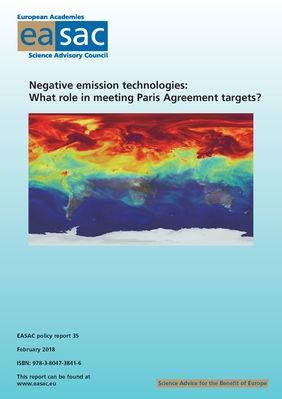 In a new report by the European Academies’ Science Advisory Council (EASAC), senior scientists from across Europe have evaluated the potential contribution of negative emission technologies (NETs) to allow humanity to meet the Paris Agreement’s targets of avoiding dangerous climate change. They find that NETs have “limited realistic potential” to halt increases in the concentration of greenhouse gases in the atmosphere at the scale envisioned in the Intergovernmental Panel on Climate Change (IPCC) scenarios. This new report finds that none of the NETs has the potential to deliver carbon removals at the gigaton (Gt) scale and at the rate of deployment envisaged by the IPCC, including reforestation, afforestation, carbon-friendly agriculture, bioenergy with carbon capture and storage (BECCs), enhanced weathering, ocean fertilisation, or direct air capture and carbon storage (DACCs).
In a new report by the European Academies’ Science Advisory Council (EASAC), senior scientists from across Europe have evaluated the potential contribution of negative emission technologies (NETs) to allow humanity to meet the Paris Agreement’s targets of avoiding dangerous climate change. They find that NETs have “limited realistic potential” to halt increases in the concentration of greenhouse gases in the atmosphere at the scale envisioned in the Intergovernmental Panel on Climate Change (IPCC) scenarios. This new report finds that none of the NETs has the potential to deliver carbon removals at the gigaton (Gt) scale and at the rate of deployment envisaged by the IPCC, including reforestation, afforestation, carbon-friendly agriculture, bioenergy with carbon capture and storage (BECCs), enhanced weathering, ocean fertilisation, or direct air capture and carbon storage (DACCs).
“Scenarios and projections that suggest that NETs’ future contribution to CO2 removal will allow Paris targets to be met appear optimistic on the basis of current knowledge and should not form the basis of developing, analysing, and comparing scenarios of longer-term energy pathways for the EU. Relying on NETs to compensate for failures to adequately mitigate emissions may have serious implications for future generations," state the European science academies.
Coming Soon on SkS...
- The EPA website debunked Pruitt's climate misinformation, before he deleted it (Dana)
- On model development, and sanity (Climatesight Kate)
- The latest Holocene temperature reconstruction (John Abraham)
- What's the Culprit Behind Climate Change? (Adam Levy)
- New research this week (Ari Jokimäki)
- 2018 SkS Weekly Climate Change & Global Warming News Roundup #7 (John Hartz)
- 2018 SkS Weekly Climate Change & Global Warming Digest #7 (John Hartz)
Poster of the Week...
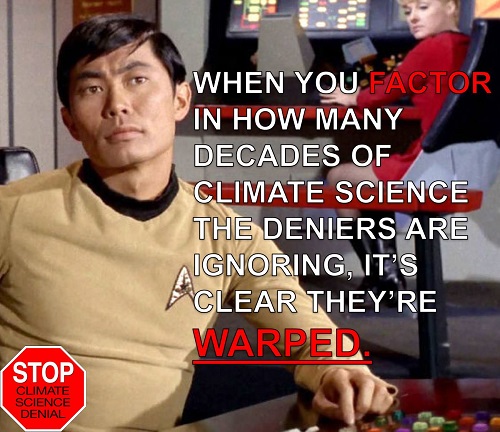
Climate Feedback Reviews...
EPA’s Scott Pruitt incorrectly suggests climate change might not be “a bad thing”
CLAIM
"We know that humans have most flourished during times of, what, warming trends. I think there are assumptions made that because the climate is warming, that that is necessarily a bad thing."
VERDICT

Scott Pruitt, KSNV NBC Las Vegas, 6 Feb. 2018
Unsupported: There is no basis to Pruitt's claim that humans have flourished during past periods of similarly rapid warming. The last 10,000 years, during which human civilization has developed, have seen stable climate conditions.
Misleading: Research unambiguously shows that the net effect of continued climate change this century—factoring in both positives and negatives—is significant harm to humans and the rest of Earth’s ecosystems.
Misrepresents the scientific process: Scientists do not simply assume that warming has dangerous consequences. This is a careful conclusion derived from extensive research.
KEY TAKE AWAY
While some effects of climate change will be beneficial in some locations, the evidence from scientific research very clearly shows that the negative effects vastly outweigh any positives. This is the result of the rapid rate of warming—not a departure from an “ideal temperature” for our planet. Pruitt’s claim that the human contribution to global warming is unclear was evaluated in a previous Claim Review and found to be incorrect.
EPA’s Scott Pruitt incorrectly suggests climate change might not be “a bad thing”, Climate Feedback. Feb 9, 2018
SkS Week in Review...
- 2018 SkS Weekly Climate Change & Global Warming News Roundup #6 by John Hartz
- New research, January 29 - February 4, 2018 by Ari Jokimäki
- Climate change is increasing flood risks in Europe by John Abraham (Climate Consensus - the 97%, Guardian)
- How to Change Your Mind About Climate Change by David Kirtley
- Humans need to become smarter thinkers to beat climate denial by Dana Nuccitelli (Climate Consensus - the 97%, Guardian)
- In-depth: Scientists discuss how to improve climate models by Staff (Carbon Brief)
- 2018 SkS Weekly Climate Change & Global Warming Digest #5 by John Hartz
97 Hours of Consensus...
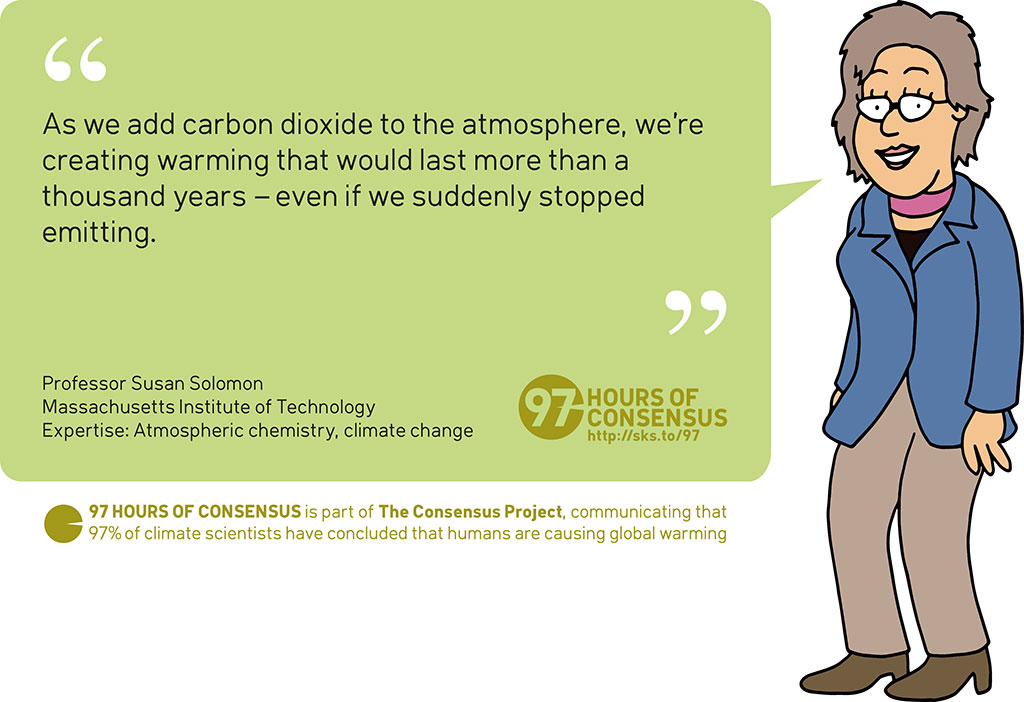
Quote provided by email































 Arguments
Arguments






























Robert De Niro takes aim at US President Donald Trump's climate change policy.
"Hollywood star Robert De Niro has taken aim at US President Donald Trump's stance on climate change, telling a packed audience in the Middle East that he was visiting from a "backward" country suffering from "temporary insanity".
He said that in the country he was describing, the head of the Environmental Protection Agency suggested last week that global warming may be a good thing for humanity.
"I am talking about my own country, the United States of America. We don't like to say we are a 'backward' country, so let's just say we're suffering from a case of temporary insanity,'' he added.
Is it possible to remove CO2 directly out the atmosphere, and bury it? I'm no chemist, but at a guess there would seem to be various pathways possible, involving sucking air through solutions, and converting CO2 to carbonate compounds etc.
You could power the fans with solar power. However presumably it's a huge task, and would require massive numbers of instillations.
Yes, removal is possible by several mechanism. Old tech is removing CO2 from industrial gas streams with amine solution. This is used to remove CO2 from natural gas for instance (eg at Kapuni for a close-to-home example). More radical methods have been pushed by Wally Broecker and particularly Klaus Lackner, see this for example. Cost and commitment are the big factors.
Other schemes note that natural systems already absorb CO2 (eg plant more forest) and CO2 sequestration in oceans is dependent on Ca flux from silicates (the weathering thermostat). Theoretically you could mine and crush lots of Ca- bearing silicates and let weathering leach the Ca into ocean. I suspect you will find more discussion in the IPCC WG3 reports.
"Negative emission technologies will not compensate for inadequate climate change mitigation efforts".
The song remains the same. Burning of fossil fuels is a harmful unsustainable pursuit of Private Interest that the hope for the development of 'new helpful technology' does not excuse.
The biggest barrier to the development of Carbon Removal is 'a lack of popularity and profitability'. And claiming that 'future generations' will figure out how to overcome/solve the problems created by the inconsiderate pursuits of Private Interest today also does not excuse what some people continue to try to get away with.
Removing carbon to correct the developed problem faces challenges similar to correcting the amount and type of energy consumption fueling the way people live. What needs to happen is a 'charitable act of self-sacrifice by the wanna-be-winners competing in popularity and profitability games' for the benefit Others (including all future generations of humanity) without any personal reward for the ones making the charitable sacrifice, and a detriment for the ones who gambled bigger on getting away with behaving less acceptably (including those unfortunate people who allowed themselves to be tempted to buy the vehicle they 'were tempted to like' even though it was less efficient than alternatives, or cheaper than more responsible alternatives).
The ability to get away with burning fossil fuels cheap has significantly delayed the development of more sustainable ways of living.
Pruitt’s claims fell apart immediately because he didn’t acknowledge that there has NEVER never been a warming trend as rapid as is currently happening. Humanity and the planet are in new, unknown territor, making ignorance even more dangerous.
[JH] The use of all-caps constitutes shouting and is prohibited by the SkS Comments Policy. To emphasize a word or a sentence segment, please use bold font.
Gavin is visiting Down Under and talking about unknown biosystem, glacial & feedbacks feedbacks we are to hit soon and we need to brace for them:
Expect more 'complete surprises' from climate change: NASA's Schmidt